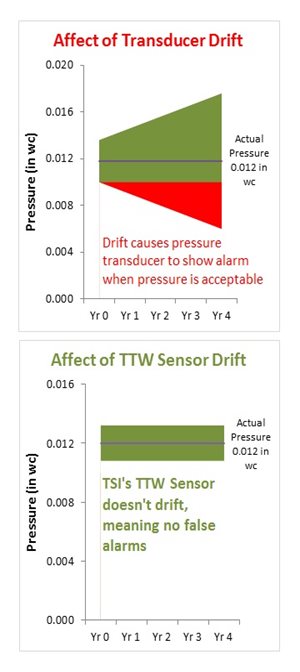PREVENTING INFECTION HOSPITAL MONITORING AND CONTROL
Controlling the spread of airborne infectious disease can be challenging for hospitals and other healthcare facilities. Groups such as the Facilities Guidelines Institute (FGI), US Centers for Disease Control (CDC), American Society of Healthcare Engineers (ASHE) have written standards such as ASHRAE 170-2017 requiring positive and negative room pressure differentials for specific rooms. Airborne infectious isolation (AII) rooms require negative pressure to contain airborne bacteria in the room. Operating rooms and protective environment (PE) rooms require positive pressure to keep pathogens out.
Designing a hospital for positive or negative room pressure differentials is not enough. Room pressure differential must be monitored to ensure occupant health and to comply with standards. Two technologies are used to measure room pressure differential: capacitive pressure transducers and through-the-wall (TTW) sensors.

TRADITIONAL: CAPACITIVE PRESSURE TRANSDUCERS
Hospitals traditionally use capacitive pressure transducers to measure room pressure differentials. This method uses plastic tubing installed in the walls to send the pressure from the rooms to the pressure transducer. The room pressure differential changes the capacitance between two membranes inside the pressure transducer. The pressure transducer determines the pressure differential by measuring this capacitance. Capacitive pressure transducers are best for measuring pressure transducers much larger than hospitals use for AII, PE and operating rooms. Temperature changes can affect the accuracy of capacitive pressure transducers. Capacitive pressure transducers are also vulnerable to drift, leading to false alarms if they are not frequently recalibrated.
TOP CHOICE: THROUGH-THE-WALL SENSORS
TTW sensors use thermal anemometry to measure air velocity and direction through a small opening in the wall. TTW sensors convert the air velocity to pressure differential, just like pitot tubes are often used to measure air velocity by measuring air pressure. TTW sensors are the most accurate way to measure room pressure differential. Most importantly, TTW sensors are proven to be stable so the room pressure measurement does not need frequent calibration to remain accurate.